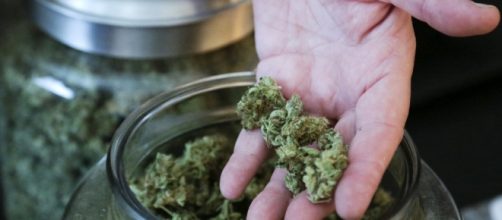On Saturday, amid fireworks and the bright lights of Las Vegas, eager masses turned out to wait in line for their first legal purchase of recreational marijuana, ABC News reports.
Temperatures in the triple digits did not deter people of all ages from waiting in long lines outside dispensaries on the Las Vegas strip, according to ABC. At midnight on July 1, fireworks littered the skies in a joint celebration of Independence Day and the new legislation. Some stood in line for five hours, according to CBS News.
What are the restrictions?
Nevada’s Regulation and Taxation of Marijuana Act was passed in the most recent November 2016 election.
The legislation, like that on alcohol, allows people in the state over 21 to legally buy, sell and use cannabis. Some restrictions are that buyers must possess a valid ID, and they can only purchase up to 1 ounce of the plant or up to 1/8 of an ounce of edibles. Another provision is that shops cannot sell edibles that look like lollipops or other foodstuffs that could be marketed to children. It is still illegal to use cannabis in public, which includes hotel rooms and casinos. It must be used indoors, and violators are subject to a $600 fine, according to ABC News.
This presents a problem for tourists, who are expected to make up 60 percent of pot sales. Nevada state senator Tick Segerblom told CBS News that alternatives may be needed for out-of-town guests, and ideas have been circling around bed-and-breakfasts, hotels and restaurants.
Some other ideas could be offering licenses for coffee shops.
Southern and Northern Nevada are now among the areas that have legal dispensaries. There are currently four known shops in Reno that have received approval from the state and are waiting on licenses, according to Reno Gazette-Journal.
Fireworks, long lines and even a wedding marked the start of recreational marijuana sales in Nevada this weekend https://t.co/zI75z4MB4H pic.twitter.com/5flEBRBFJg
— CNN (@CNN) July 2, 2017
State revenue expected to increase
When the state of Colorado legalized recreational pot in 2014, sales reached $700 million just that year.
In February 2017 alone, Colorado brought in over $17 million from marijuana taxes, licenses, and fees, according to the Colorado Department of Revenue.
The retail marijuana excise tax, at a rate of 15 percent, put forward over $5 million toward the Public School Fund (previously known as the Marijuana Tax Cash Fund). Medical marijuana sales continue to exceed recreational sales.
It is curious how a natural plant like cannabis is kept off limits for the rest of the 45 states, citing potential side effects such as laziness and short-term memory loss. However, it is legal to advertise synthetic medications that can cause potential lethal side effects like tuberculosis, lymphoma, hepatitis B, and heart failure.
Marijuana has been used to successfully help treat conditions such as glaucoma, nerve pain, muscle spasms caused by multiple sclerosis, nausea from cancer/chemotherapy, seizure disorders, Crohn's disease, and poor appetite caused by chronic illnesses, according to WebMD.
More states are expected to legalize recreational marijuana in the future. Matthew A. Karnes, founder of GreenWave Advisors, a New York City-based firm that provides financial analysis and research for the legal cannabis industry, told High Times that he expects that by 2021, every state will have a program in place for medical or fully legal cannabis. He did point out, however, that this is not based on federal legislation, and it would be possible assuming the “Trump administration does not interfere with anything.”


